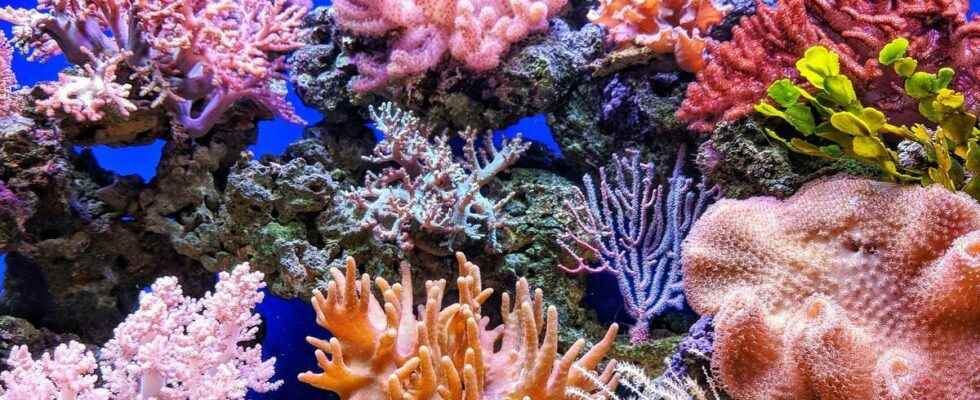Posted on 05/13/2022 at 5:32 p.m.,
Reading 3 mins.
Researchers recently discovered how sunscreen affects coral. A study that will tomorrow allow the marketing of sunscreens that are safe for corals and humans.
According to the Oceanographic Institute of Monaco, corals are home to 30% of marine biodiversity. These reefs are real shelters against predators, but also breeding grounds for many species. Coral is therefore one of the richest and most diversified ecosystems on the planet.
But it is increasingly threatened for several reasons, all related to human action: global warming, pollution, overfishing… or even sunscreens.
For several years, the chemicals contained in sunscreens have indeed been singled out. According to researchers at Stanford University, sunscreens would become harmful when in contact with reefs. They therefore wanted to study the chemical process at the origin of this damage. The results of their study were published on May 6, in the journal Science.
Oxybenzone, the enemy of corals
According to the researchers, one substance in particular is harmful to corals: oxybenzone. This organic chemical compound is the one that protects us from the sun’s ultraviolet (UV) rays – that’s why it’s also called an ultraviolet filter. Oxybenzone is present in many sunscreens, especially worn by tourists exploring the reefs.
This sunscreen-derived chemical had previously been shown to be a possible factor in increasing coral mortality rates, especially for those already affected by other stressors. This is why certain ultraviolet filters in sunscreens have been banned in several coastal areas. This is the case in Hawaii, in the United States Virgin Islands, in the island nation of Palau and even in Bonaire, an island municipality in the Netherlands.
Oxybenzone and the sun don’t mix
The researchers wanted to characterize the chemical and biological mechanisms by which oxybenzone harms corals. To do this, they exposed two groups of anemones and mushroom corals to oxybenzone in artificial seawater. The first group was under a simulated sun; the second, no. Result ? The anemones exposed to the sun all died within 17 days, while the anemones in the second group remained alive. The association oxybenzone + sun has led to the formation of harmful and toxic radicals for corals.
The researchers were very surprised: “It was strange to see that oxybenzone made sunlight toxic to corals – the opposite of what it’s supposed to do”since it is an ultraviolet filter.
They also found that the corals had evolved a unique defense mechanism, thanks to the symbiotic algae that surround them. They seemed to be able to protect them since they sequestered the toxins produced after the oxybenzone-sun association. But with global warming, especially in the oceans, stressed corals are expelling the algae supposed to protect them. So the reefs bleach and become more vulnerable to disease, environmental shocks and oxybenzone.
The researchers nevertheless insisted that the mechanisms by which oxybenzone was harmful remained largely a mystery… “Which would make it difficult to ensure that the components of sunscreens offered as alternatives are truly safer for corals” specify the authors.
Towards safe sunscreens for corals and humans
You will have understood: oxybenzone is a chemical filter that prevents the harmful rays of the sun from damaging the skin. But to be better absorbed by the skin, it is composed of molecules likely to cause hormonal imbalances in humans. This component would therefore be doubly toxic; for the coral and for the human being.
But oxybenzone might not be the only problematic ingredient in sunscreens, since many of its components share similar chemical structures and are likely to react in the same way when in contact with the sun. Many marketed sunscreens being “safe for corals” contain metals, such as zinc or titanium, rather than organic compounds, such as oxybenzone. And according to the researchers, it is uncertain whether these components are safer for corals.
One thing is certain: this study offers real hope for the health of corals and humans, since its results could contribute to the development and marketing of effective and safe sunscreens.
